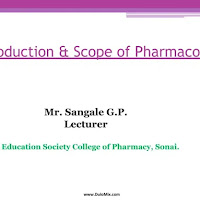Download PDF Notes & PPT: Introduction and Scope of Pharmacology
Access foundational study materials on the Introduction and Scope of Pharmacology. This resource, available as a downloadable PDF, is essential for students beginning their journey in medicine, pharmacy, nursing, and related health sciences. You'll find clear notes and potentially PPT summaries.
Download these comprehensive notes for offline study or view the document online. Understand the definition of pharmacology, its main branches (pharmacokinetics and pharmacodynamics), its historical development, and its vast scope, including drug discovery, development, clinical application, and regulation.
Keywords for this resource:
Download PDF, Introduction to Pharmacology, Scope of Pharmacology, Pharmacokinetics Notes, Pharmacodynamics PPT, Drug Definition, Branches of Pharmacology, Clinical Pharmacology, Toxicology, Drug Development, Free Medical Study Material, Slides By DuloMix.
Introduction and Scope of Pharmacology: Exploring the Science of Drugs
Pharmacology is the scientific discipline that studies the interactions between living organisms and chemical substances that affect normal or abnormal biochemical functions. In a simpler sense, it is the science of drugs. The term "drug" broadly refers to any chemical agent, other than food, that affects living processes. Pharmacology is a cornerstone of medicine, pharmacy, nursing, and veterinary medicine, providing the rational basis for the therapeutic use of drugs to prevent, diagnose, and treat diseases.
Definition and Core Concepts
The word "pharmacology" originates from the Greek words "pharmakon" (meaning drug or poison) and "logos" (meaning study). Thus, pharmacology is the study of drugs, encompassing their origin, chemical structure, preparation, administration, mechanisms of action, effects on the body, metabolism, and excretion.
Two fundamental branches form the core of pharmacology:
- Pharmacokinetics (PK): Describes "what the body does to the drug." It involves the study of the time course of drug:
- Absorption: How the drug enters the body.
- Distribution: How the drug spreads throughout the body's tissues and fluids.
- Metabolism (Biotransformation): How the drug is chemically altered by the body, usually to facilitate its elimination.
- Excretion: How the drug and its metabolites are removed from the body.
- Pharmacodynamics (PD): Describes "what the drug does to the body." It involves the study of:
- The biochemical and physiological effects of drugs.
- Their mechanisms of action at the molecular, cellular, organ, and organism levels.
- The relationship between drug concentration and effect (dose-response relationships).
Historical Perspective
While the use of natural substances for medicinal purposes dates back to ancient civilizations, pharmacology as a distinct scientific discipline emerged in the 19th century. Early observations by figures like François Magendie and Claude Bernard laid the groundwork for experimental pharmacology. The isolation of active compounds from plants (e.g., morphine from opium by Friedrich Sertürner) and the synthesis of new drugs (e.g., aspirin) marked significant advancements. The 20th century witnessed an explosion in drug discovery and development, driven by advances in chemistry, physiology, and molecular biology, leading to the development of antibiotics, vaccines, and numerous other life-saving medications.
Scope of Pharmacology
Pharmacology is a broad and multidisciplinary science with an extensive scope, encompassing various specialized areas:
- Clinical Pharmacology: Focuses on the application of pharmacological principles to human subjects, including the study of drug effects, efficacy, safety, and rational drug use in patients. It bridges basic pharmacology with clinical medicine and includes areas like pharmacometrics and therapeutic drug monitoring.
- Toxicology: The study of the adverse effects of chemicals (including drugs) on living organisms. It investigates the mechanisms of toxicity, dose-response relationships for toxic effects, and the diagnosis and treatment of poisoning.
- Pharmacotherapeutics: The use of drugs in the prevention, diagnosis, and treatment of diseases. It involves selecting the appropriate drug, dosage, and duration of therapy for individual patients based on evidence-based medicine.
- Chemotherapy: Specifically deals with the use of drugs to treat infections (antibiotics, antivirals, antifungals) and cancer (antineoplastic agents).
- Neuropharmacology: Studies the effects of drugs on the nervous system, including a_nalgesics, anesthetics, antipsychotics, antidepressants, and drugs of abuse.
- Cardiovascular Pharmacology: Focuses on drugs affecting the heart and blood vessels, such as antihypertensives, antiarrhythmics, and lipid-lowering agents.
- Endocrine Pharmacology: Deals with drugs affecting the endocrine system, including hormones and their antagonists.
- Immunopharmacology: Studies the effects of drugs on the immune system, including immunosuppressants and immunostimulants.
- Pharmacogenetics/Pharmacogenomics: Investigates how genetic variations influence individual drug responses (both efficacy and toxicity), paving the way for personalized medicine.
- Drug Discovery and Development: A complex, lengthy, and expensive process that involves identifying new drug targets, screening for active compounds, preclinical testing (in vitro and in vivo), and clinical trials in humans to establish safety and efficacy before regulatory approval.
- Pharmacoepidemiology: Studies the use and effects of drugs in large populations, focusing on drug safety surveillance (pharmacovigilance) and assessing the benefits and risks of drugs in real-world settings.
- Pharmacoeconomics: Evaluates the cost-effectiveness of drug therapies, informing healthcare policy and resource allocation.
- Regulatory Pharmacology: Deals with the laws, regulations, and guidelines governing the development, testing, manufacturing, marketing, and use of drugs to ensure their safety, efficacy, and quality.
Importance of Pharmacology
Pharmacology plays a vital role in modern healthcare and biomedical research:
- It provides the scientific basis for understanding how drugs work and for their rational therapeutic use.
- It is essential for the discovery and development of new medicines to combat diseases.
- It helps in optimizing drug therapy to maximize benefits and minimize adverse effects.
- It contributes to public health by ensuring drug safety and efficacy through regulatory processes and pharmacovigilance.
- It educates healthcare professionals on the proper use of medications, promoting patient safety and effective treatment outcomes.
In conclusion, pharmacology is a dynamic and indispensable science that continuously evolves with advancements in our understanding of biology, chemistry, and medicine. Its broad scope impacts nearly every aspect of healthcare, from the laboratory bench to the patient's bedside.
Info!
If you are the copyright owner of this document and want to report it, please visit the copyright infringement notice page to submit a report.

